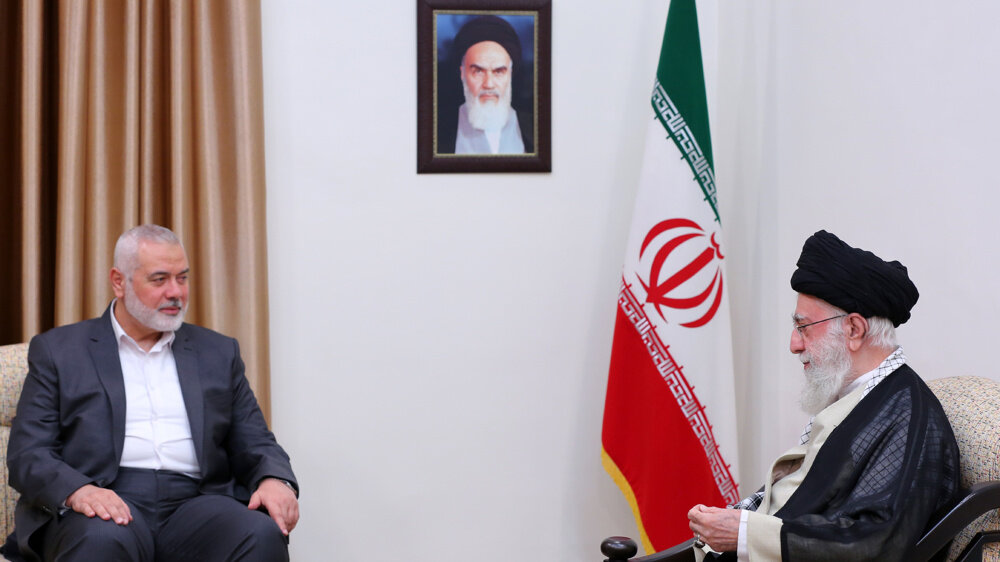Hamas leader Haniyeh met Ayatollah Khamenei
Backing Palestinian resistance groups is Iran’s permanent policy, Leader tells Haniyeh

TEHRAN- Ismail Haniyeh, the Hamas political bureau chief is said to have met with Ayatollah Seyed Ali Khamenei in Iran recently, a top Hamas member has revealed.
According to the Beirut-based TV channel Al Mayadeen, Osama Hamdan, who is the chief representative of Hamas in Lebanon and a member of its politburo, stated on Saturday that Haniyeh visited Tehran “a couple of days ago” and “met and talked with” Ayatollah Khamenei.
The meeting took place as Israel is at a fierce war with the Gaza Strip. The meeting in the middle of the war is highly important.
The Palestinian resistance forces of Hamas and Islamic Jihad are resisting Israeli troops that have entered the Gaza Strip.
Israel has launched relentless attacks on Gaza after Hamas launched a surprise and unprecedented operation against the Zionist regime outside Gaza, killing many settlers and capturing more than 200 Israelis, among them military personnel. The attack has put into question the Israeli intelligence.
Israel itself has admitted that it has not suffered such a defeat in its 75 years of occupation of the Palestinian lands.
The action triggered the Israeli regime’s savage military campaign against the Palestinian enclave of Gaza.
Hamdan said that Hamas is proud of the support it has been receiving from the Axis of Resistance, which includes groups in the West Asia region that are opposed to the Israeli regime and the hegemonic policies of the U.S. government and its allies in the region.
Iran is a major backer of Hamas. However, Iran says the parties operating within the Axis of Resistance, including Hamas, work independently of Tehran in terms of policymaking and military operations.
By attacking the Israelis or U.S. military bases in the region, resistance groups in Iraq, Lebanon, and Yemen have helped Hamas continue its struggle against the Israeli regime.
Before the new meeting, Haniyeh, whose office is in Doha, Qatar, met with the Leader of the Islamic Revolution in Tehran on June 21. During that meeting, Ayatollah Khamenei told Haniyeh that the sense of responsibility of the young and faithful Palestinian generation and their individual and collective presence on the battlefield was a very important issue.
“What happened recently in Jenin and the siege of the Zionist military by the Palestinian youth are clear examples of this new scene and heralds a bright future and full victory for the Palestinians,” underlined Ayatollah Khamenei.
In June, Israel launched biggest attacks on the occupied West Bank, killing about 20 Palestinians in the Jenin refugee camp and wounding at least 100 more. The attacks by the Zionist regime were the largest in years. The Jenin refugee camp was originally established in 1953 to house Palestinians who were ethnically cleansed during the Nakba of 1948 – which forced some 750,000 from their homes to make way for the establishment of Israel.
The camp has seen much unrest over the decades and was nearly destroyed in 2002 when Israeli soldiers ambushed it during the second Intifada.
In the June 21 meeting, the Leader of the Islamic Revolution emphasized that the issue of Palestine is at the heart of the Islamic world. "The amount of progress that is made on the Palestinian issue will influence the amount of progress that will be made regarding the issues of the Islamic nation,” he said.
The Leader considered the international atmosphere to be in the interest of the Palestinian people despite all the existing pressures from some governments.
Ayatollah Khamenei also re-emphasized the issue of “unity” and harmony among the Resistance groups. “In the recent battle in Gaza (the attack that Israel launched before October 7), we saw that the enemy’s attempt was to create discord and division among the Resistance groups.”
The Leader of the Islamic Revolution regarded Gaza as the center of Resistance, adding that the point that will bring the enemy to its knees is the West Bank, where good progress has been made so far.
